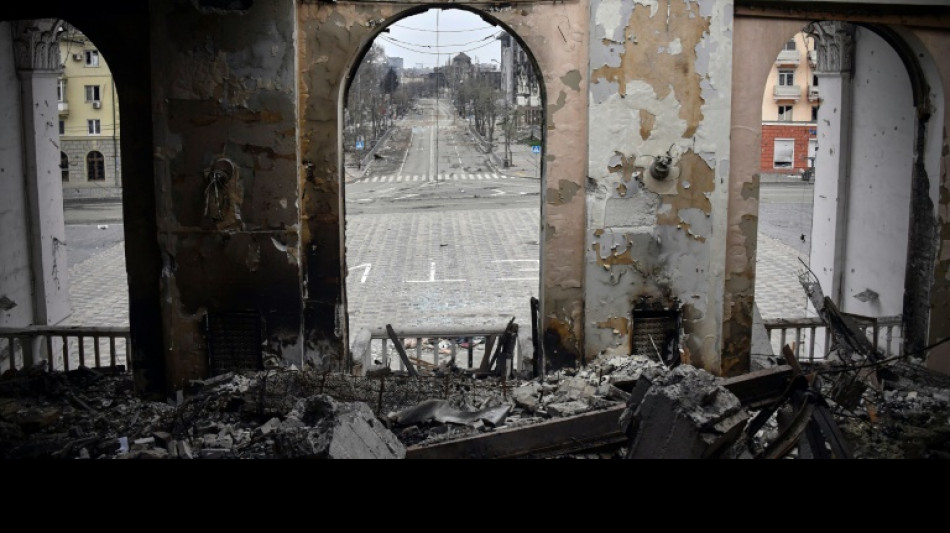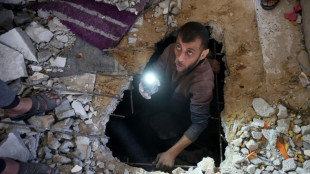
-
 Quartararo sets Spanish MotoGP record to claim pole
Quartararo sets Spanish MotoGP record to claim pole
-
Hamas says open to 5-year Gaza truce, one-time hostages release

-
 Iran, US hold new round of high-stakes nuclear talks
Iran, US hold new round of high-stakes nuclear talks
-
Up at dawn for front-row seat to history at Francis's funeral

-
 Pakistan ready to 'defend sovereignty' after India threats
Pakistan ready to 'defend sovereignty' after India threats
-
Huge crowds flock to Vatican for Pope Francis's funeral

-
 Xi says China must 'overcome' AI chip challenges
Xi says China must 'overcome' AI chip challenges
-
Indian army says new exchange of gunfire with Pakistan

-
 Epstein accuser Virginia Giuffre takes own life in Australia: family
Epstein accuser Virginia Giuffre takes own life in Australia: family
-
Hundreds of buildings damaged, dozens injured in 6.3 Ecuador quake

-
 India and Pakistan's Kashmir fallout hits economy too
India and Pakistan's Kashmir fallout hits economy too
-
Francis's funeral to be grand farewell to 'pope of the poor'

-
 Pogacar faces defiant Evenepoel at Liege-Bastogne-Liege
Pogacar faces defiant Evenepoel at Liege-Bastogne-Liege
-
Chelsea eye great escape against Barcelona in Women's Champions League

-
 Iran, US to hold new round of high-level nuclear talks
Iran, US to hold new round of high-level nuclear talks
-
'Energy and effort' pay off for Reds as Blues' woes continue

-
 Albatross and closing birdie lift China's Liu to LPGA Chevron lead
Albatross and closing birdie lift China's Liu to LPGA Chevron lead
-
On the horizon? Wave of momentum for high seas treaty

-
 Top Mistakes to Avoid When Building Credit History
Top Mistakes to Avoid When Building Credit History
-
Developing countries should fast-track US trade deals: World Bank president

-
 Grizzlies' Morant 'doubtful' for must-win game 4 v Thunder
Grizzlies' Morant 'doubtful' for must-win game 4 v Thunder
-
Trump in Rome for pope funeral in first foreign trip of new term

-
 Trump says Russia-Ukraine deal 'very close' after new Kremlin talks
Trump says Russia-Ukraine deal 'very close' after new Kremlin talks
-
US rookies lead PGA pairs event with McIlroy and Lowry in hunt

-
 Trump tariff promises get a reality check
Trump tariff promises get a reality check
-
Warriors coach Kerr 'relatively optimistic' injured Butler will play game 3

-
 Postecoglou hopes 'Stonecutter's Credo' can inspire Spurs
Postecoglou hopes 'Stonecutter's Credo' can inspire Spurs
-
PSG lose unbeaten Ligue 1 record ahead of Arsenal showdown

-
 Venezuela accuses El Salvador president of 'human trafficking'
Venezuela accuses El Salvador president of 'human trafficking'
-
Own goal takes Sundowns to African final against Pyramids

-
 Scores of buildings damaged, 20 injured in Ecuador quake
Scores of buildings damaged, 20 injured in Ecuador quake
-
US stocks extend rally as market eyes busy calendar next week

-
 Pope's death triggers surge of disinformation he fought against
Pope's death triggers surge of disinformation he fought against
-
Rovanpera takes control of Rally Islas Canarias

-
 Zelensky insists Crimea is Ukrainian as US envoy meets Putin
Zelensky insists Crimea is Ukrainian as US envoy meets Putin
-
Patel and Mendis help Sunrisers beat Kings in Dhoni's 400th T20

-
 Copa del Rey ref statements 'unacceptable': Real Madrid after boycotting final build-up
Copa del Rey ref statements 'unacceptable': Real Madrid after boycotting final build-up
-
Insurance CEO's accused killer pleads not guilty to federal murder charges

-
 FBI arrests Wisconsin judge for shielding undocumented migrant
FBI arrests Wisconsin judge for shielding undocumented migrant
-
Brazil ex-president Collor de Mello jailed for corruption

-
 Zelensky insists Crimea 'belongs' to Ukraine as US envoy meets Putin
Zelensky insists Crimea 'belongs' to Ukraine as US envoy meets Putin
-
Real Madrid boycott Copa del Rey build-up over referee complaints

-
 Trinidad and Tobago votes for parliament, PM, with opposition in lead
Trinidad and Tobago votes for parliament, PM, with opposition in lead
-
IMF chief hails 'constructive' Spring Meetings held under tariff uncertainty

-
 Iran FM Araghchi in Oman ahead of nuclear talks with US
Iran FM Araghchi in Oman ahead of nuclear talks with US
-
Dozens of buildings destroyed, 20 injured in Ecuador quake

-
 Young Barca must 'enjoy' Real Madrid Copa final fight: Flick
Young Barca must 'enjoy' Real Madrid Copa final fight: Flick
-
Pakistan and India border closure separates families

-
 Brazil's Bolsonaro 'stable' after post-surgery setback
Brazil's Bolsonaro 'stable' after post-surgery setback
-
Catholics in secular Cuba hail Francis as 'bridge'


Is Russia as isolated as Ukraine's allies hope?
Two months into Russia's invasion of Ukraine, US President Joe Biden's claim that Moscow is more isolated than ever looks more like wishful thinking.
Efforts to ostracise Moscow have faced resistance from a reluctant section of the international community.
"There's a very clear isolation of Russia from the Western bloc, especially due to the series of successive sanctions that have complicated commercial and financial exchanges," said Sylvie Matelly, deputy director at the French Institute for International Relations and Strategic Affairs.
"As for Russia's isolation on the international scene, the situation is quite different, with a number of very cautious countries that have refused to give in to Western pressure," the French researcher added.
Russia's invasion, launched on February 24 with the stated objective to "denazify" and demilitarise Ukraine, provoked immediate outrage in Europe and North America, where leaders vowed to isolate Moscow and impose "unprecedented" sanctions.
In the weeks that followed, NATO and EU airspace closed to Russian planes and the United States ordered bans on importing Russian oil and gas, as well as seafood, vodka and diamonds.
Some Russian banks were excluded from the Swift international payment system and hundreds of prominent figures were prohibited from touching down on European soil.
- 'Fantasy of the free world' -
But outside the West, the response has been more cautious.
At the UN General Assembly on March 2, India and South Africa abstained during a vote demanding Russia's withdrawal from Ukraine.
In Latin America, Brazil and Mexico refused to participate in the barrage of sanctions.
"There are a growing number of countries that are more willing to assert their independence in spite of the fact that they aspire to closer cooperation with the West and are even in need of Western support," Chris Landsberg, a professor of international relations at the University of Johannesburg, was quoted as saying by the Washington Post.
"It's one thing to condemn the invasion of Ukraine -– it's another to launch an economic war against Russia, and many countries in South America, Africa and Asia are not ready to cross the line," the former Chilean ambassador to India and South Africa Jorge Heine added.
"They don't want to be pushed into a position that would go against their own interests, economic or otherwise."
This appears to be the case for Saudi Arabia and the UAE, which have so far avoided taking a stand against Russia. It could also be said for India, which abstained during a vote condemning the Russian invasion at the UN Security Council in February.
"For India, the war has posed a stark and unwelcome choice between the West and Russia, a choice that it has done everything possible to avoid making," explained Shivshankar Menon, former national security adviser to Indian Prime Minister Manmohan Singh.
"The United States is an essential and indispensable partner in India's modernisation, but Russia remains an important partner for geopolitical and military reasons," he wrote in an article published at the beginning of April, entitled: "The Fantasy of the Free World: Are Democracies Really United Against Russia?"
- Limited results -
For former French ambassador Michel Duclos, this tendency is nothing new -- even if it takes on a whole new dimension in Ukraine.
"Already in 2015 with the Syrian crisis and the first Ukrainian crisis, we had neither India nor Brazil with us," he said. "We have to ask ourselves: why is this the case, and what can we do to build stronger bridges with these countries? The question is more relevant than ever before".
Western powers are making efforts on the ground.
UNESCO has been ramping up discussions over the past two months to relocate the meeting of the World Heritage Committee, which was set to take place in Russia in June.
But it's yielded limited results: the announcement of an indefinite postponement, so far with no guarantee to prevent Russia hosting the meeting once the invasion is over.
A similar attempt was made with the G20 grouping of major economies. The Indonesian presidency was urged to exclude Moscow from the forum, but ultimately refused to do so in the name of impartiality.
The lack of short-term effects of economic sanctions is not helping the West convince hesitant countries either.
"Yes, the sanctions are tough, but they do not deter Putin from extending his siege on Mariupol... or shelling other cities," said Judy Dempsey, an analyst at the Carnegie Europe think tank.
"If the objective was to sway Putin so he withdraws from Ukraine, it's got to be said it hasn't worked," Matelly said. "He has certainly scaled down his ambitions, but not so much in response to the sanctions as to the determination of Ukrainian forces on the ground."
It will take more time to see the full impact of the sanctions.
"The situation with the Russian economy will be clearer in June or July, because now the economy is still functioning off the back of its reserves," said Russian financial analyst Alexey Vedev of the Gaidar Institute for Economic Policy.
"The reserves are dwindling, but as long as they still exist, the sanctions are not fully felt," he added.
A.Mahlangu--AMWN